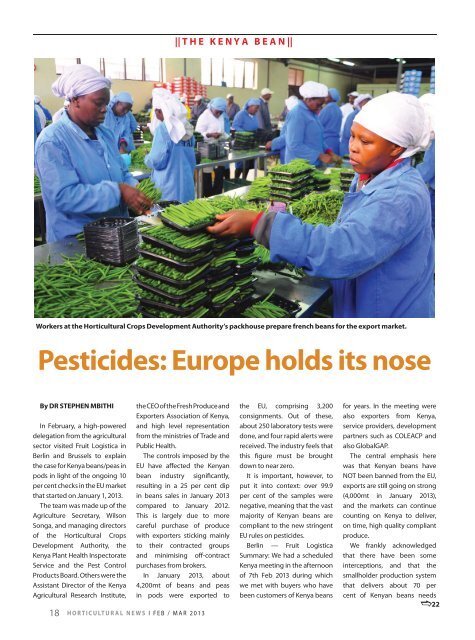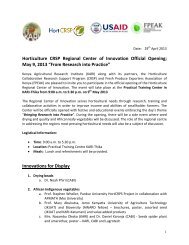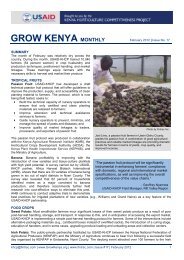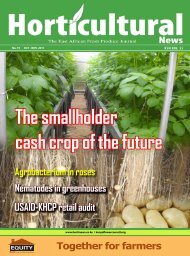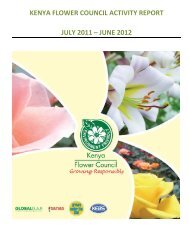FEB-MARCH 2013 ISSUE Final.ai - Hortinews.co.ke
FEB-MARCH 2013 ISSUE Final.ai - Hortinews.co.ke
FEB-MARCH 2013 ISSUE Final.ai - Hortinews.co.ke
You also want an ePaper? Increase the reach of your titles
YUMPU automatically turns print PDFs into web optimized ePapers that Google loves.
|| T H E K E N Y A B E A N ||<br />
Wor<strong>ke</strong>rs at the Horticultural Crops Development Authority’s packhouse prepare french beans for the export mar<strong>ke</strong>t.<br />
Pesticides: Europe holds its nose<br />
By DR STEPHEN MBITHI<br />
In February, a high-powered<br />
delegation from the agricultural<br />
sector visited Fruit Logistica in<br />
Berlin and Brussels to expl<strong>ai</strong>n<br />
the case for Kenya beans/peas in<br />
pods in light of the ongoing 10<br />
per cent checks in the EU mar<strong>ke</strong>t<br />
that started on January 1, <strong>2013</strong>.<br />
The team was made up of the<br />
Agriculture Secretary, Wilson<br />
Songa, and managing directors<br />
of the Horticultural Crops<br />
Development Authority, the<br />
Kenya Plant Health Inspectorate<br />
Service and the Pest Control<br />
Products Board. Others were the<br />
Assistant Director of the Kenya<br />
Agricultural Research Institute,<br />
18<br />
the CEO of the Fresh Produce and<br />
Exporters Association of Kenya,<br />
and high level representation<br />
from the ministries of Trade and<br />
Public Health.<br />
The <strong>co</strong>ntrols imposed by the<br />
EU have affected the Kenyan<br />
bean industry significantly,<br />
resulting in a 25 per cent dip<br />
in beans sales in January <strong>2013</strong><br />
<strong>co</strong>mpared to January 2012.<br />
This is largely due to more<br />
careful purchase of produce<br />
with exporters sticking m<strong>ai</strong>nly<br />
to their <strong>co</strong>ntracted groups<br />
and minimising off-<strong>co</strong>ntract<br />
purchases from bro<strong>ke</strong>rs.<br />
In January <strong>2013</strong>, about<br />
4,200mt of beans and peas<br />
in pods were exported to<br />
HORTICULTURAL NEWS I <strong>FEB</strong> / MAR <strong>2013</strong><br />
the EU, <strong>co</strong>mprising 3,200<br />
<strong>co</strong>nsignments. Out of these,<br />
about 250 laboratory tests were<br />
done, and four rapid alerts were<br />
received. The industry feels that<br />
this figure must be brought<br />
down to near zero.<br />
It is important, however, to<br />
put it into <strong>co</strong>ntext: over 99.9<br />
per cent of the samples were<br />
negative, meaning that the vast<br />
majority of Kenyan beans are<br />
<strong>co</strong>mpliant to the new stringent<br />
EU rules on pesticides.<br />
Berlin — Fruit Logistica<br />
Summary: We had a scheduled<br />
Kenya meeting in the afternoon<br />
of 7th Feb <strong>2013</strong> during which<br />
we met with buyers who have<br />
been customers of Kenya beans<br />
for years. In the meeting were<br />
also exporters from Kenya,<br />
service providers, development<br />
partners such as COLEACP and<br />
also GlobalGAP.<br />
The central emphasis here<br />
was that Kenyan beans have<br />
NOT been banned from the EU,<br />
exports are still going on strong<br />
(4,000mt in January <strong>2013</strong>),<br />
and the mar<strong>ke</strong>ts can <strong>co</strong>ntinue<br />
<strong>co</strong>unting on Kenya to deliver,<br />
on time, high quality <strong>co</strong>mpliant<br />
produce.<br />
We frankly acknowledged<br />
that there have been some<br />
interceptions, and that the<br />
smallholder production system<br />
that delivers about 70 per<br />
cent of Kenyan beans needs<br />
22


